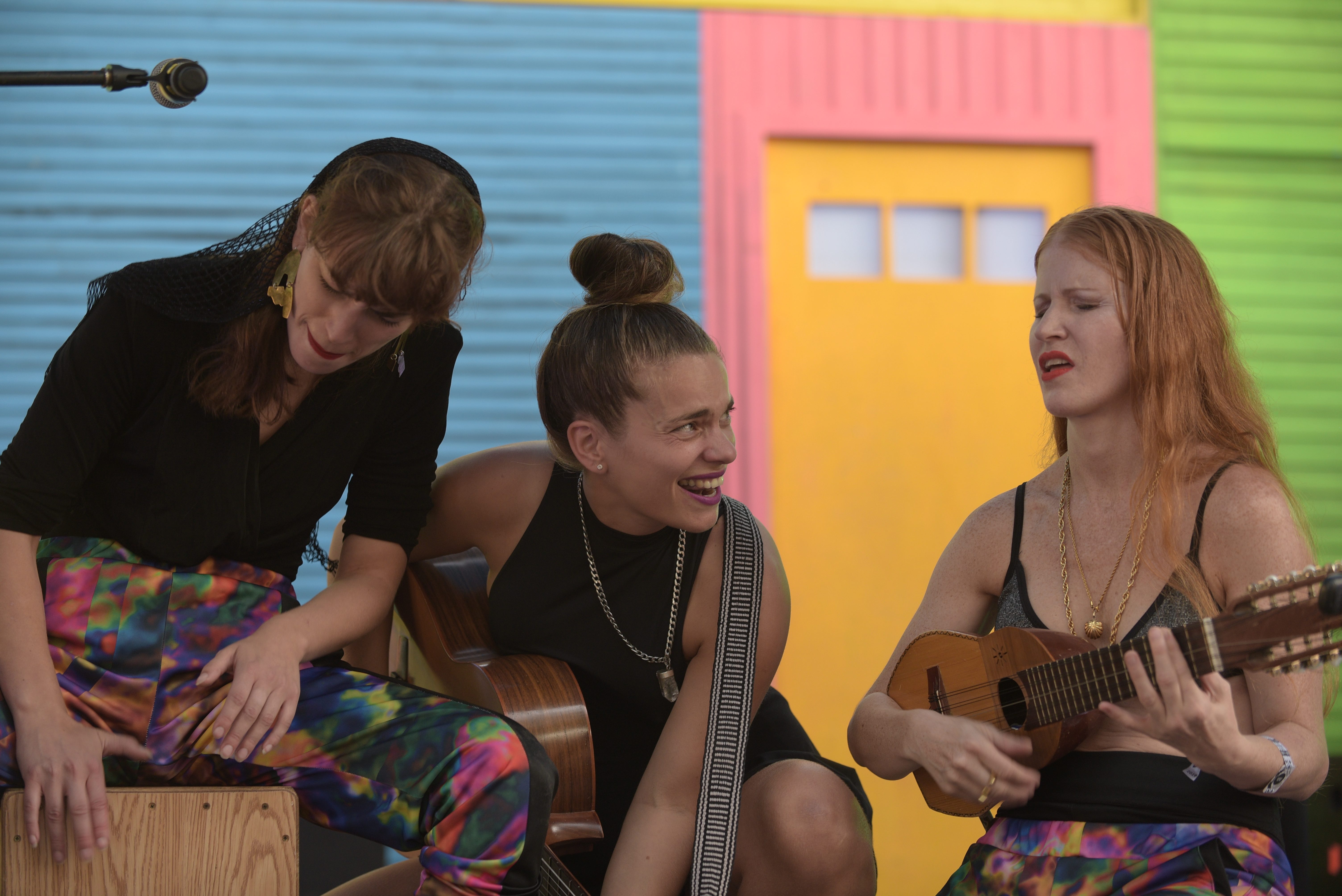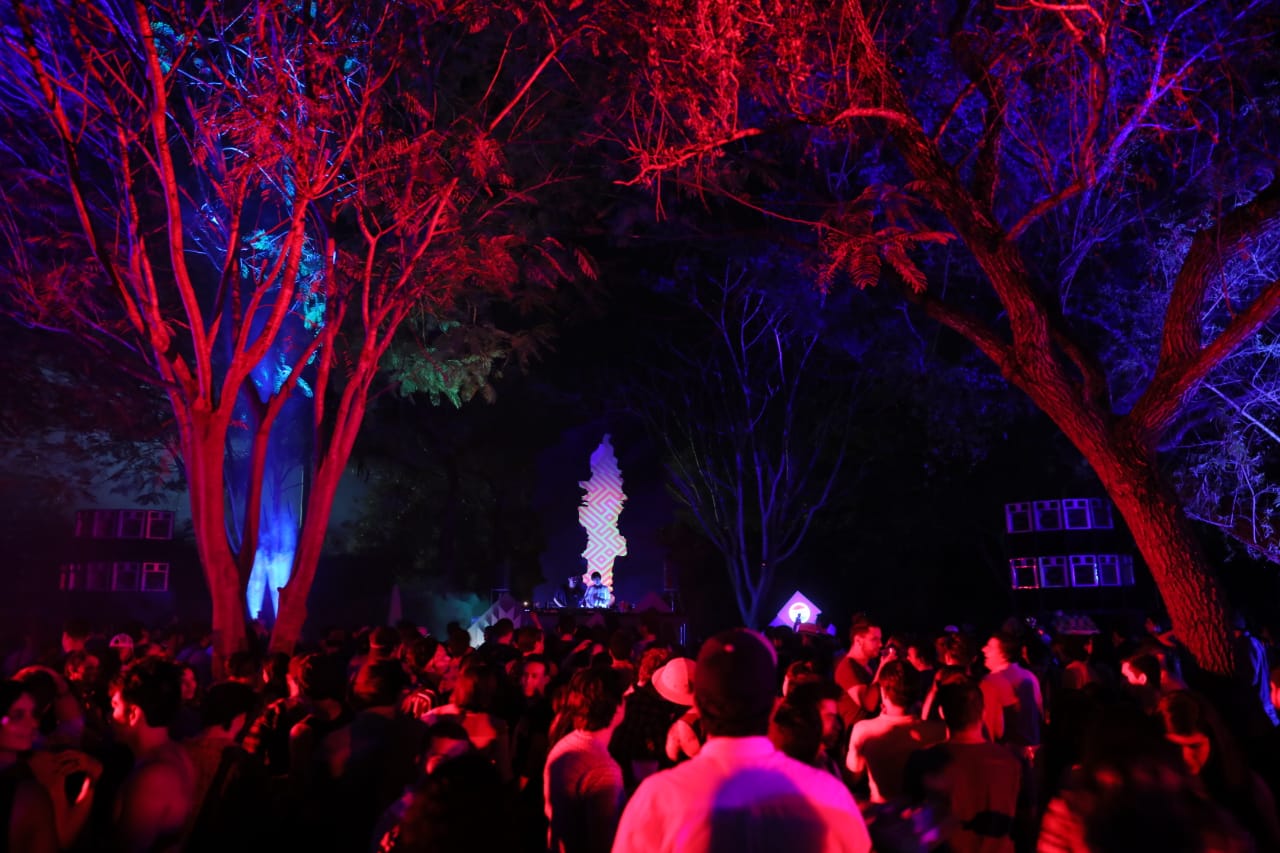Excess was the name of the game this weekend as the seventh edition of Carnaval de Bahidorá took over Las Estacas, an ecological reserve in the Mexican state of Morelos, where hedonism, glamour, and artistic visions coalesced into an unforgettable party in the jungle. The impressively organized festival featured nine stages, over 50 art installations, glamping, a designers’ market, a wide selection of food trucks and access to nature walks, and the crystal clear Yautepec River, which served as a tranquil and idyllic backdrop.
By the time noon rolled around on Saturday, Bahidorá was in full swing as thousands of revelers clad in colorful bathing suits and wide-brimmed hats eagerly drifted towards the escapist fantasies of their choosing. Fans of electronic club music went to the Búnker stage, where sets by DJs Pareja, Honey Dijon, and Louie Vega kept the crowd thrashing well into the morning. El Asoleadero, on the other hand, offered a resort vibe where partygoers could enjoy pop and global bass from Que Madre, DJ Bien Buena, and DJ Python while beating back the suffocating heat from the refreshing comfort of the riverbank.

Saturday’s first major highlight came from R&B chanteuse Noa Sainz, who opened La Estación stage backed by musicians from artsy Mexican hip-hop outfit The Guadaloops. The set was glossy, soulful perfection, as Sainz led the crowd through favorites from her debut EP No Science and performed several new tracks steeped in trap production that hinted towards a fresh release later this year. In the evening, as the stage took a much more dance oriented direction, Salviatek co-founder Lechuga Zafiro’s new project F5 blew everyone away as he melded his malevolent production style with a trio of candombe drummers from legendary Uruguayan comparsa Cuareim 1080.
Argentine folk-pop trio Fémina also performed at La Estación, providing the day’s poignant high point with dramatic songs that spoke of social unity and womanhood. Singing to a crowd wearing green kerchiefs emblazoned with the hashtags #AbortoParaTodoMéxico and #AbortoLegalYa, the color of the Latin American reproductive rights movement, the powerful performance was largely dedicated to solidarity with local activists and the audience full of women. Fémina’s Sofia Trucco, a new mother, summed up the palpable emotion with an empathetic prayer: “May our children come when we wish them to.”

Over on Sonorama, Bahidorá’s main stage, acts like Meridian Brothers and Daymé Arocena brought on the Caribbean sabrosura while battling the scorching sun and temperatures reaching into the high 90s. Audiences who had trouble standing the heat were elated to discover a number of the main stage acts would be performing second sets at a secluded new jungle space called La Madriguera. Arocena took full advantage of her wild surroundings, elevating what was essentially a makeshift palm shack into an elegant jazz club, where her powerful vocals and stage presence created an intimate and spellbinding atmosphere. Other standouts from La Madriguera included La Bruja de Texcoco, who entranced her audience with a series of huapangos and boleros while playing the violin and the harp, and a campy tribute to Juan Gabriel led by popular impersonator Cesar David El Divo de Ciudad de Mexico who performed most of his set atop a chair in the middle of the frenzied crowd.

Despite these excellent performances, the weekend was unfortunately not all dreamy bliss. Bahidorá’s reputation for attracting elite crowds with a penchant for drug-addled overindulgence has come under scrutiny after news broke Sunday night that the yet unidentified body of a man had been found downstream in the Yautepec River. Authorities haven’t confirmed if the cause of death is linked to alcohol or drug abuse, but the conversation dominating social media has focused on who should be held accountable for the tragedy. Though many accused Bahidorá of negligence and lax security, bag checks were mandatory before entering the park and lifeguards lined the river throughout the day, with a strict policy of swimming hours ending at 6 p.m.
Over the years Bahidorá has sadly gained a reputation as a destination for drug tourism; the festival is cuttingly referred to as “Bahidrogá” by those familiar with the excessive habits of its attendees. I was told many times the popularity of drugs at Bahidorá is a way of offsetting the hefty cost of food and drink – a growing trend among Mexican music festivals catering to glamorous boutique crowds with a price tag to match.

One also wonders whether the rowdy crowd that Bahidorá attracts isn’t quite aligned with the festival’s ethos. There seemed to be little regard for the environmental impact the festival so fervently aims to reduce, with piles of garbage left behind after every performance. Trashcans were easily accessible and staffers diligently cleaned up the grassy fields after every show, and even had a huge recycling station at the entrance to the festival, which should have served as a reminder for all to keep account of their own waste. And as in previous editions, dozens of festival goers were spotted wearing indigenous headdresses and tribal face paint, which has famously stirred controversy in Bahidorá’s past and remains indicative of some attendees’ pervasive desire to emulate tone deaf festival aesthetics.
Bahidorá is at a precarious intersection where organizers are balancing an important ecological agenda with their status as a posh musical getaway, all while trying to cope with the backlash from the weekend’s punctuating incident. Make no mistake, this edition of Bahidorá was executed in outstanding fashion and as someone who attends many similar events a year, I am failing to recall the last time I had so much fun at a music festival. One can only hope organizers take this trying time as an opportunity to regroup, rethink security measures and keep a spotlight on their environmental mission to ensure future editions of Bahidorá remain a thrilling and vibrant experience for all.







